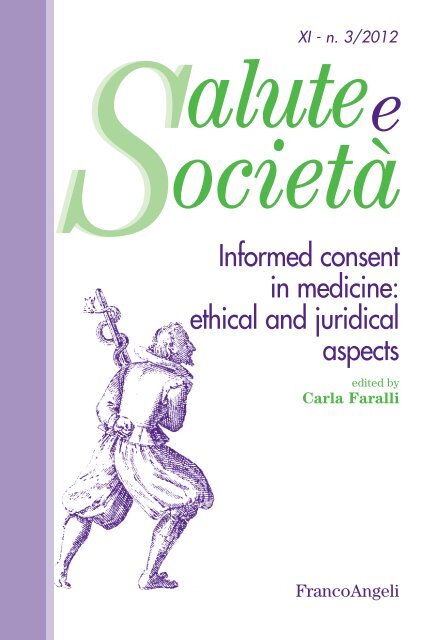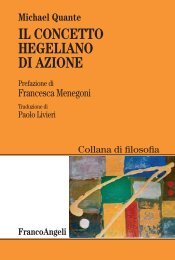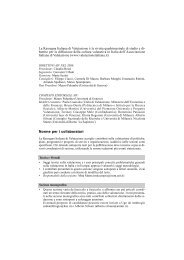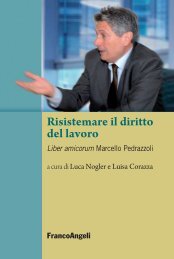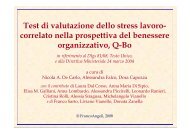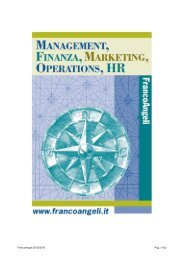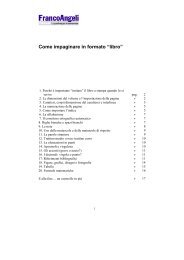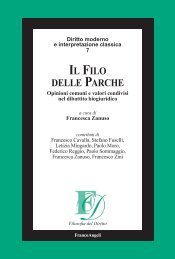E-book FrancoAngeli - Franco Angeli Editore
E-book FrancoAngeli - Franco Angeli Editore
E-book FrancoAngeli - Franco Angeli Editore
You also want an ePaper? Increase the reach of your titles
YUMPU automatically turns print PDFs into web optimized ePapers that Google loves.
S Informed consent<br />
in medicine:<br />
ethical and juridical<br />
aspects<br />
XI - n. 3/2012<br />
ocietà e alute<br />
edited by<br />
Carla Faralli<br />
<strong><strong>Franco</strong><strong>Angeli</strong></strong>
alute<br />
ocietà e<br />
S<br />
Informed consent<br />
in medicine:<br />
ethical and juridical<br />
aspects<br />
edited by<br />
Carla Faralli<br />
<strong><strong>Franco</strong><strong>Angeli</strong></strong>
The journal is published on behalf of Università degli Studi di Bologna<br />
Scientific Board<br />
Achille Ardigò† (President), Augusto Balloni, Domenico Berardi, Patrizio Bianchi, Ivan<br />
Cavicchi, Vincenzo Cesareo, Gianluigi Cetto, Daniela Cocchi, Nicola Comodo, Paolo De<br />
Nardis, Flavio Delbono, Pierpaolo Donati, Carla Faralli, Silvio Garattini, Mariapia Garavaglia,<br />
Riccardo Gatti, Leopoldo Grosso, Rossella Levaggi, David Mechanic, Aldo Morrone, Umberto<br />
Nizzoli, Marco Patierno, Alfredo Rebora, Giuseppe Remuzzi, Paolo Roberti di Sarsina, Alex<br />
Robertson, Giovanni B. Sgritta, Francesco Taroni, Marco Trabucchi, Paolo Vanni, Paolo Vineis,<br />
Bruna Zani.<br />
Editorial Board<br />
Costantino Cipolla (Scientific Editor in chief), Leonardo Altieri, Cleto Corposanto, Guido<br />
Giarelli, Sebastiano Porcu, Alessandra Sannella (NIHMP Delegate), Paolo Ugolini (SISS<br />
Delegate), Roberto Vignera (AIS Delegate).<br />
Technical-Scientific Committee<br />
Antonio Maturo (Scientific Secretary), Linda Lombi (Scientific Coordinator), Agnese Accorsi,<br />
Veronica Agnoletti, Alessia Bertolazzi, Francesca Guarino, Maurizio Esposito, Ilaria Iseppato,<br />
Lorella Molteni, Luca Mori, Fabio Piccoli, Elisa Porcu, Alice Ricchini.<br />
Editorial<br />
Annamaria Perino (Advisor), Anna Apicella, Roberto Battilana, Rosemarie Callà, Sara Capizzi,<br />
Gerardo Catena, Antonio Chiarenza, Francesca Cremonini, David Donfrancesco, Elena Elia,<br />
Laura Farneti, Stefania Florindi, Ivo Germano, Barbara Ghetti, Rossana Giacomoni, Carlo<br />
Antonio Gobbato, Maura Gobbi, Silvia Lolli jr, Silvia Lolli sn, Luigi Mazza, Lorenzo Migliorati,<br />
Cecilia Morelli, Lara Nanetti, Andrea Paltrinieri, Nicoletta Poppi, Francesca Rossetti, Alessandra<br />
Rota, Roberta Russo, Elisabetta Scozzoli, Nicola Strizzolo, Rossella Trapanese, Marco Venturini,<br />
Valeria Verdolini, Susanna Vezzadini, Angelo Villini, Fabio Voller.<br />
Local Scientific Unit<br />
UNIVERSITY UNITS: Università di Ancona (Scientific Coordinator: Maria Giovanna<br />
Vicarelli; Scientific Secretary: Sabrina Dubbini); Università di Cassino (Coord. Scient.:<br />
Francesco Maria Battisti; Segr. Scient.: Paolo Russo); Università di Catanzaro (Coord. Scient.:<br />
Guido Giarelli; Segr. Scient.: Eleonora Venneri); Università Cattolica di Milano (Coord.<br />
Scient.: Clemente Lanzetti; Segr. Scient.: Rita Bichi); Università di Palermo (Coord. Scient.:<br />
Antonio La Spina; Segr. Scient.: Fabio Massimo Lo Verde); Università di Roma III (Coord.<br />
Scient.: Roberto Cipriani; Segr. Scient.: Luca Diotallevi); Università di Salerno (Coord. Scient.:<br />
Tullia Saccheri; Segr. Scient.: Giuseppina Cersosimo); Università di Sassari (Coord. Scient.:<br />
Alberto Merler; Segr. Scient.: Remo Siza); Università di Siena (Coord. Scient.: Roberto De<br />
Vita; Segr. Scient.: Fabio Berti); Università di Torino (Coord. Scient.: Willem Tousijn; Segr.<br />
Scient.: Vincenzo Giorgino); Università di Trento (Coord. Scient.: Antonio Scaglia; Segr.<br />
Scient.: Davide Galesi); Università di Trieste (Coord. Scient.: Alberto Gasparini; Segr. Scient.:<br />
Daniele Del Bianco); Università di Verona (Coord. Scient.: Mauro Niero; Segr. Scient.: Cristina<br />
Lonardi).<br />
INSTITUTIONAL UNITS: ASR Abruzzo (Coord. Scient.: Francesco di Stanislao; Segr. Scient.:<br />
Alessandra Rosetti); ASR Emilia-Romagna (Coord. Scient.: Roberto Grilli; Segr. Scient.: Marco<br />
Biocca); ASR Friuli Venezia-Giulia (Coord. Scient.: Lionello Barbina; Segr. Scient.: Laura
Minin); ARS Marche (Coord. Scient.: Maurizio Belligoni; Segr. Scient.: Andrea Gardini);<br />
ASR Toscana (Coord. Scient.: Stefania Rodella; Segr. Scient.: Stefano Beccastrini); Arsan<br />
Campania (Coord. Scient.: Tonino Pedicini; Segr. Scient.: Enrico de Campora); Associazione<br />
Stampa Medica (Coord. Scient.: Giancarlo Calzolari; Segr. Scient.: Filippo Calzolari);<br />
Azienda Ospedaliera di Padova (Coord. Scient.: Patrizia Benini; Segr. Scient.: Silvana<br />
Bortolami); CERFE (Coord. Scient.: Marco Montefalcone; Segr. Scient.: Daniele Mezzana);<br />
Collegi IPASVI (Coord. Scient.: Gennaro Rocco; Segr. Scient.: Alessandro Stievano); CUP<br />
2000 (Coord. Scient.: Mauro Moruzzi; Segr. Scient.: Giulia <strong>Angeli</strong>); Federfarma Emilia-<br />
Romagna (Coord. Scient.: Domenico Dal Re; Segr. Scient.: Dante Baldini); Fondazione<br />
Cesar (Coord. Scient.: Giancarlo Brunello; Segr. Scient.: Giulia Zamagni); Ospedale San<br />
Martino - Genova (Coord. Scient.: Loredana Sasso; Segr. Scient.: Rita Rosso); Osservatorio<br />
Metropolitano Dip. Patologiche - Ausl Bologna (Coord. Scient.: Raimondo Pavarin; Segr.<br />
Scient.: Silvia Marani).<br />
International Advisory Editor<br />
Cecilia M. Benoist (University of Victoria, Canada), John J. Bruhn (New Mexico State<br />
University, Usa), Peter Conrad (Brandeis University, Usa), Mary Fennell (Brown University,<br />
Usa), Eugene B. Gallagher (University of Kentucky, Usa), Siegfried Geyer (Università di<br />
Hannover, Germania), Claudine Herzlich (CERMES, Parigi, Francia), David Hughes (University<br />
of Swansea, Gran Bretagna), Inez Johansson (University College of Health Sciences, Jönköping,<br />
Svezia), David J. Kallen (Michigan State University, Usa), Donald Light (University of Medicine<br />
& Dentistry, New Jersey, Usa), Linda Montanari (Osservatorio Europeo Droghe e<br />
Tossicodipendenze, Lisbona, Portogallo), Jake Najman (University of Queensland, Australia),<br />
Jürgen Pelikan (Università di Vienna, Austria), Mike Sacks (De Montfort University, Leicester,<br />
Gran Bretagna), Josep A. Rodríguez (Università di Barcelona, Spagna), Mauro Serapioni<br />
(Universidade Estadual do Ceará, Brasile), Ulrich Stöessel (Università di Friburgo, Germania),<br />
Silvia Mamede Studart Soares (Universidade Federal do Ceará, Brasile), Hilary Thomas<br />
(University of Hertfordshire, Gran Bretagna), Göran Tomson (Karolinska Institute, Stoccolma,<br />
Svezia), Andrew Twaddle (University of Missouri-Columbia, Usa).<br />
Manuscripts are blind-reviewed by two anonymous referees.<br />
Scientific Editor in chief<br />
Costantino Cipolla, Dipartimento di Sociologia, Strada Maggiore 45, 40125 Bologna<br />
tel. 051/2092858-0543/374205<br />
www.saluteesocieta.com<br />
Technical-Scientific Committle<br />
Scientific Secretary: Antonio Maturo, Facoltà di Scienze Politiche, via G. della Torre 1, 47100 Forlì<br />
tel. 0543/374207, e-mail: saluteesocieta@gmail.com<br />
Editorial Coordinator<br />
Anna Buccinotti, e-mail: buccinotti@francoangeli.it<br />
For Info<br />
<strong><strong>Franco</strong><strong>Angeli</strong></strong> srl, viale Monza 106, 20127 Milano, tel. 02/2837141<br />
Ufficio abbonamenti: fax 02/2895762, e-mail: riviste@francoangeli.it<br />
www.francoangeli.it<br />
Autorizzazione del Tribunale di Milano n. 137 del 6 marzo 2002 - Quadrimestrale - Direttore responsabile:<br />
Stefano <strong>Angeli</strong> - Poste Italiane Spa - Sped. in Abb. Post. - D.L. 353/2003 (conv. in L.<br />
27/02/2004 n. 46) art. 1, comma 1, DCB Milano - Copyright 2012 by <strong><strong>Franco</strong><strong>Angeli</strong></strong> srl - Stampa: Tipomonza,<br />
via Merano 18, Milano.<br />
Terms III 2012 - English Italian Version - Printed in february 2013
Copy Editing by Paola Canestrini
Salute e Società. Confronti. Numeri usciti e curatori<br />
2002<br />
Costantino Cipolla, Guido Giarelli, Dopo l’aziendalizzazione. Nuove strategie di governance<br />
in sanità (a. I, n. 1)<br />
Leonardo Altieri, Ascolto e partecipazione dei cittadini in sanità (a. I, n. 2)<br />
Gruppo Cerfe, Per una interdipendenza attiva tra Nord e Sud del pianeta (a. I, n. 3)<br />
2003<br />
Giorgino Enzo, Willem Tousijn, Attraversando terre incognite: una sfida per la professione<br />
infermieristica (a. II, n. 1)<br />
Mauro Moruzzi, Antonio Maturo, e-Care e Salute (a. II, n. 2)<br />
Tullia Saccheri, Prima che ... Promozione della salute e responsabilità istituzionali (a. II, n. 3)<br />
2004<br />
Giovanna Vicarelli, Il paradigma perduto? Medici nel duemila (a. III, n. 1)<br />
Cinzia Conti, Giovanni B. Sgritta, L’immigrazione e politiche socio-sanitarie. La salute degli<br />
altri (a. III, n. 2)<br />
Società Italiana di Sociologia della Salute, La sociologia della salute in Italia: temi, approcci,<br />
spendibilità - The Sociology of Health in Italy: Topics, Approaches, Practicability (a. III,<br />
n. 3 - numero bilingue italiano-inglese)<br />
Mauro Moruzzi, Costantino Cipolla, Telemedicina (a. III, n. 3 - Supplemento)<br />
2005<br />
Paola Maria Fiocco, Luca Mori, La disabilità tra costruzione dell’identità e cittadinanza (a.<br />
IV, n. 1)<br />
Rosanna Memoli, Dimensioni socio-sanitarie dell’ambiente (a. IV, n. 2)<br />
Domenico Secondulfo, Medicina Medicine. Le cure “altre” in una società che cambia (a. IV,<br />
n. 3)<br />
2006<br />
Guido Giarelli, Siegfried Geyer, Prospettive europee sui sistemi sanitari che cambiano (a. V,<br />
n. 1 - Supplemento)<br />
Carlo Borzaga, Luca Fazzi, Del non profit sociosanitario (a. V, n. 1)<br />
Raffaele Rauty, Le contraddizioni del corpo: presenza e simbologia sociale (a. V, n. 2)<br />
Sergio Belardinelli, Leonardo Allodi, Ivo Germano, Bioetica del dolore (a. V, n. 3)<br />
2007<br />
Marco Ingrosso, Fra reti e relazioni: percorsi nella comunicazione della salute (a. VI, n. 1)<br />
Costantino Cipolla, Il consumo di sostanze psicoattive oggi (a. VI, n. 1 - Supplemento/Numero<br />
speciale in occasione del V anno di Salute e Società)<br />
Francesca Guarino, Licia Mignardi, Tecnologie a rete per la salute e l’assistenza (a. VI, n. 2 -<br />
supplemento)<br />
Cleto Corposanto, Sulla valutazione della qualità nei servizi sociali e sanitari (a. VI, n. 2)<br />
Andrea Gardini, L’ospedale del XXI secolo (a. VI, n. 3)<br />
2008<br />
Augusto Balloni, Roberta Bisi, Processi di vittimizzazione e reti di sostegno alle vittime (a.<br />
VII, n. 1)<br />
Nicola Porro, Sergio Raimondo, Sport e salute (a. VII, n. 2)<br />
Francesco Maria Battisti, Maurizio Esposito, Cronicità e dimensioni socio-relazionali (a. VII,<br />
n. 3)<br />
2009<br />
Giuseppe Costa, Cesare Cislaghi, Nicola Caranci, Le disuguaglianze sociali di salute. Problemi<br />
di definizione e di misura (a. VIII, n. 1)<br />
Ilaria Iseppato, Simona Rimondini, Le reti dell’accesso per la sanità e l’assistenza (a. VIII, n.<br />
1 - Supplemento)<br />
Antonio Maturo, Peter Conrad, La medicalizzazione della vita - The Medicalization of Life (a.<br />
VIII, n. 2 - numero bilingue italiano-inglese)<br />
Costantino Cipolla, Mauro Moruzzi, Achille Ardigò e la sociologia della salute (a. VIII, n. 2 -<br />
Supplemento)<br />
Donatella Cavanna, Luisa Stagi, Sul fronte del cibo. Corpo, controllo, soggettività (a. VIII, n. 3)<br />
Società Italiana di Sociologia della Salute, Essere e Fare il sociologo in sanità (a. VIII, n. 3 -<br />
Supplemento)
2010<br />
Alberto Marradi, Daniele Nigris, Evidence-Based Medicine: una critica (a. IX, n. 1)<br />
Roberto Cipriani, Narrative-Based Medicine: una critica (a. IX, n. 2)<br />
Guido Giarelli per la Eshms, Metodologie di ricerca comparata in Sociologia della salute e<br />
della medicina - Comparative Research Methodologies in Health and Medical Sociology<br />
(a. IX, Suppl. al n. 2 - numero bilingue italiano-inglese)<br />
Mauro Giacca, Carlo Gobbato, Polis genetica e società del futuro - Polis genetica and society<br />
of the future (a. IX, n. 3 - numero bilingue italiano-inglese)<br />
<strong>Franco</strong> Prina, Enrico Tempesta, I giovani e l’alcool: consumi, abusi, politiche. Una rassegna<br />
critica multidisciplinare - Youth and Alcohol: Consumption, Abuse and Policies. An Interdisciplinary<br />
Critical Review (a. IX, Suppl. al n. 3 - numero bilingue italiano-inglese)<br />
Guido Giarelli, Roberto Vignera, Sociologia e sociologia della salute: andata e ritorno - Sociology<br />
and sociology of health: A round trip (a. XI, n. 2 - numero bilingue italiano-inglese)<br />
2011<br />
Carmine Clemente, Giuseppina Cersosimo, La fine pre-scelta. Forme e disposizioni sulla propria<br />
morte - The pre-chosen death. End of life arrangements and instructions (a. X, n. 1 -<br />
numero bilingue italiano-inglese)<br />
Leonardo Altieri, Maria Augusta Nicoli, Vittoria Sturlese La sanità dei cittadini - Citizens’<br />
health services (a. X, n. 2 - numero bilingue italiano-inglese)<br />
Mauro Niero, Giovanni Bertin, Vulnerabilità e fragilità sociale. Una teoria delle disuguaglianze<br />
di salute - Vulnerability and social frailty. A theory of health inequalities (a. X, n.<br />
3 - numero bilingue italiano-inglese)<br />
2012<br />
Fosco Foglietta, <strong>Franco</strong> Toniolo, Nuovi modelli di governance e integrazione socio-sanitaria -<br />
New models of governance and health system integration (a. XI, n. 1 - numero bilingue<br />
italiano-inglese)<br />
Guido Giarelli, Roberto Vignera, Sociologia e sociologia della salute: andata e ritorno - Sociology<br />
and sociology of health: A round trip (a. XI, n. 2 - numero bilingue italiano-inglese)<br />
Antonio Maturo, Kristin Barker, Medicina delle emozioni e delle cognizioni - Medicine of<br />
emotions and cognitions (a. XI, Suppl. al n. 2 - numero bilingue italiano-inglese)<br />
Carla Faralli, Consenso informato - Informed consent (a. XI, n. 3 - numero bilingue italianoinglese)<br />
Numeri programmati e curatori<br />
2012<br />
Franca Orletti, Marilena Fatigante, La sfida della multiculturalità nell’interazione medico-paziente<br />
– The challenge of multiculturality in patient-physician interaction (a. XI, suppl. al<br />
n. 3 - numero bilingue italiano-inglese)<br />
2013<br />
Elisabetta Ruspini, Sessualità, salute, istituzioni. Dalle pratiche di controllo ai percorsi educativi<br />
– Sexuality, health, institutions: From control practices to educational pathways (a.<br />
XII, n. 1 - numero bilingue italiano-inglese).<br />
Gennaro Rocco, Alessandro Stievano, Scenari plurali dell'assistenza infermieristica - Multiple<br />
scenarios in nursing care (a. XII, n. 2 - numero bilingue italiano-inglese)<br />
Rita Biancheri, Genere e salute - Gender and health (a. XII, n. 3 - numero bilingue italiano-inglese)
Contents a. XI, n. 3, 2012<br />
<br />
EDITORIAL<br />
9 Stefano Rodotà<br />
INTRODUCTION<br />
13 Carla Faralli<br />
THEORY<br />
17 Patrizia Borsellino<br />
Informed Consent. Some Philosophical-Legal Concerns<br />
42 Luigi Balestra and Riccardo Campione<br />
Self-Determination over Care:<br />
The Limits of Validity and Redress through Damages<br />
59 Marco Seri, Claudio Graziano, Daniela Turchetti, and Juri<br />
Monducci<br />
Genetic Tests and Informed Consent<br />
89 Carlo Casonato<br />
End of Life in Comparative Law:<br />
Duties, Rights, and Fuzzy Sets
Contents<br />
107 Silvia Zullo<br />
Self-Determination, Best Interest, and New Diagnostic Evidence<br />
regarding the Vegetative and Minimally Conscious States<br />
DISCUSSION<br />
125 Care and Informed Consent<br />
ed. Carla Faralli<br />
ROUND TABLE WITH: Laura Palazzani, Francesca Ingravallo, and<br />
Enrico Cieri<br />
RESEARCH<br />
139 Susi Pelotti<br />
With and For Informed Consent to Care<br />
154 Amedeo Santosuosso, Valentina Sellaroli<br />
Informed Consent, Self-Determination and Rights to Freedom in<br />
Jurisprudence<br />
DEBATE<br />
179 Roger Brownsword<br />
Informed Consent in the Information Society<br />
COMMENTS<br />
209 Alessandro Piccinini<br />
Informed Consent: Facing the Challenges of the “Brave New<br />
Data World”<br />
213 Francesca Faenza<br />
On the Role of Informed Consent in Making Medical Decisions:<br />
The Position of the Italian Constitutional Court<br />
8
EDITORIAL<br />
by Stefano Rodotà ∗<br />
When consent concerns existential situations, it moves away from the schemes<br />
and the criteria around which it was framed in legal modernity. We should not<br />
forget that the revolution enacted with the Code Civil, aptly described by Jean<br />
Carbonnier as “France’s civil constitution,” was not built on the idea of absolute<br />
property alone. True, the idea so codified did mark a transfer of power from one<br />
class to another, that is, to the historical subject of the French Revolution, the<br />
bourgeoisie, and did so in a way that way anything but symbolic. So, too, there is<br />
no denying what Cambacérès observed, underscoring that the code regulates all<br />
relationships “by reference to property.” But then, if property had not been coupled<br />
with a tool that could ensure its free circulation, the outcome would have<br />
contradicted the very point of its codification, which was to free property from its<br />
feudal bonds.<br />
Hence the contract as the power to freely dispose of one’s property, an act<br />
recognized as having a force equal to that of law, as can still be found stated in<br />
Article 1372 of our own Italian Civil Code. Therein lies the root of the “dogma of<br />
consent,” framed in such a way as to guarantee freedom and security in the<br />
circulation of goods. It is precisely this “need to ensure the circulation of goods”<br />
that we find invoked in the fine <strong>book</strong> by Emilio Betti on the legal transaction, when<br />
the discussion turns to the “practical problem of private autonomy.” 1 And here we<br />
also encounter the term self-determination, but this in relation to the goal of<br />
“furnishing individuals” with goods and services, as is befitting in the given<br />
context, where the problem is that of governing the “patrimonial relationship”<br />
under the statutory definition of contract (Article 1321 of the Italian Civil Code).<br />
This simple reference alone should suffice to alert one to how inappropriate it is<br />
to rely on these frames of reference and these concepts in an attempt to outline the<br />
institutional setting within which to locate the right to self-determination, for this<br />
∗ Stefano Rodotà, Professor Emeritus of Civil Law at the Università La Sapienza in<br />
Rome and President of the scientific committee of the European Union Agency for<br />
Fundamental Rights. He has also served as Italian data protection commissioner and has<br />
chaired the European Data Protection Working Party, s.rodota@tiscali.it<br />
Translated by Filippo Valente.<br />
1 E. Betti, Teoria generale del negozio giuridico (1950; Turin: UTET, 1952: 40-43).
Editorial<br />
right pertains to life, in itself irreducible to the logic of the market: it is a right that<br />
must accordingly find its abode in the sphere of personality, and ultimately in that<br />
of sovereignty. As Paolo Zatti has rightly commented, “dignity, identity, freedom<br />
and self-determination, and privacy in its different meanings are rights to be<br />
fashioned by specifying the qualifier ‘in the body,’” 2 and so in life.<br />
What we are witnessing is indeed a shift in the legal paradigm: a new<br />
connection between a person’s will and life, a connection recognized in<br />
constitutional law. This moves us away from the earlier connection between will<br />
and patrimony (a person’s estate) by which the civil codes have traditionally been<br />
characterized, in a setting where private autonomy is constructed solely by<br />
reference to the economic sphere, with an exclusive interest in making for reliable<br />
business affairs, while neglecting the need to secure a person’s self-government, in<br />
a sphere, that of the self, irreducible to that of the market. Individuals, then, are no<br />
longer regarded only or mainly as economic actors, but also as free makers of their<br />
own personality, in such a way that the object of their action is no longer confined<br />
to managing their economic interests but embraces the entire unfolding of their<br />
lives.<br />
The legal principle underlying the “constitutionalized” person is thus grounded<br />
in a different anthropology than that of the civil codes. Self-determination in<br />
governing the body cannot be collapsed into the consent necessary to transact<br />
business in the economic sphere. Indeed, if we are to avoid cultural<br />
misunderstandings and inappropriate political conclusions, we will have to bear in<br />
mind that the notion and rules of autonomy as consent were framed by reference to<br />
the market and its dynamics, and it would be a mistake to move that notion or the<br />
accompanying rules out of their original context.<br />
The change we are witnessing does not, however, come out of nowhere. A<br />
different conception of consent emerged in the wake of WWII, when the Nazi<br />
doctors were brought before the Nuremberg Military Tribunal in the so-called<br />
“Doctors’ Trial” of 1946: the dramatic discovery that medical power had been<br />
abusively exercised in the experimentation carried out on human beings (it would<br />
later be discovered that the same practices had been undertaken in Japan, too)<br />
sparked an immediate reaction which led to the document that would come to be<br />
known as the Nuremberg Code, whose very first words, not incidentally, are: “The<br />
voluntary consent of the human subject is absolutely essential.” Life is thus freed<br />
from encroachment by any outside power, for it belongs to the person and to his or<br />
her determinations, and the perspective is that of the constitutional principle<br />
recognizing everyone’s right to freely construct a personality.<br />
This different way of viewing self-determination in relation to life and the body<br />
forms the basis of an understanding of consent disentangled from the formalisms<br />
owed to an external criterion – namely, the need to guarantee secure economic<br />
transactions – in such a way as to bring consent under a different standard, that of<br />
the government of life.<br />
2 Zatti P. (2009), Maschere del diritto volti della vita (Milan: Giuffré), p. 86.<br />
10
Editorial<br />
We can appreciate in this sense why bio-law, when it comes to the problem of<br />
determining a person’s will, should have devised methods that mark a clear<br />
departure from the criteria in use in other situations and other areas of the law.<br />
Precisely this choice to chart a different course has attracted criticisms as harsh as<br />
they are blind to the undeniable peculiarity of the subject matter.<br />
These criticisms have been aimed in particular at the opinion rendered in Italy’s<br />
landmark case, the previously discussed one concerning Eluana Englaro, where<br />
instead a good example is offered of the way we ought to proceed in renewing our<br />
legal concepts and doctrine by reference to Articles 2, 13, and 32 of the Italian<br />
Constitution: arguing on the basis of principle makes it possible to design a<br />
framework within which to locate concrete situations. The Italian Court of<br />
Cassation has thus found it possible to explicitly invoke lifestyle as a criterion on<br />
which to rely in determining what end-of-life choices the person concerned would<br />
in fact have made. This is precisely the path followed by the Mental Capacity Act<br />
passed in the United Kingdom in 2005 and the German law of 2009 on patients’<br />
instructions and provisions. It is worth recalling that under the British law, those<br />
entrusted with deciding on behalf of an incapacitated person are asked to look to<br />
this person’s wishes and feelings, along with the beliefs and values that gave<br />
purpose to his or her life, as factors illuminating the meaning of a life through its<br />
entire arc, so that when it comes time to make the most dramatic of all personal<br />
decisions – the one concerning the end of life – this is done through an<br />
understanding of that life’s complexity as an existential affair, rather than by<br />
stripping that complexity away through a formal act exclusively based on criteria<br />
of administrative procedure. No less explicit is the German law: “A patient’s<br />
presumed will must be ascertained on the basis of concrete elements. It is<br />
necessary, in particular, to take into account any oral or written statements the<br />
patient made before becoming incapacitated, along with this person’s moral or<br />
religious beliefs and any other values he or she may have espoused.” And that is<br />
also the line taken by the Oviedo Convention on Human Rights and Biomedicine,<br />
with its broad principled statement that we must take the patient’s “previously<br />
expressed wishes” into account.<br />
Self-determination is thus identified with the life plan pursued by the person<br />
concerned. And here life is to be understood in Montaigne’s sense as “an uneven,<br />
irregular, and multiform movement,” 3 irreducible to any rigid formal scheme, for it<br />
is governed instead by an uninterrupted exercise of sovereignty, enabling that free<br />
construction of personality which we find enshrined at the outset of our own<br />
constitution as well as in others.<br />
Neither a life plan nor a lived life can be bounded within the logic of the<br />
itemized consent proper to the instruments of private autonomy designed to govern<br />
patrimonial relations.<br />
3 De Montaigne M. (1588), Essais, livre III, chapitre III, “Des trois commerces.” Quoted<br />
from The Complete Essays of Montaigne, <strong>book</strong> 3, chap. 3, “Of three kinds of association”<br />
(Stanford: Stanford University Press, 1958).<br />
11
Editorial<br />
What is needed in either case is an institutional framework making it possible<br />
to uniquely appreciate each person through a narrative unfolding over time,<br />
through a sequence of behaviours comprising an entire biography, and it is on this<br />
basis that a reconstruction of consent can have any legitimacy.<br />
12
INTRODUCTION<br />
by Carla Faralli ∗<br />
Informed consent has had an essential role in shaping the therapeutic<br />
process, but it raises issues that are not just medical – for they also bear<br />
legal, moral, and philosophical import – and they intersect in several ways.<br />
That is why the discussion is fundamentally interdisciplinary: as can be<br />
appreciated from the vast literature on the topic, the debate draws scholars<br />
from different backgrounds, constantly engaged in an effort to grasp the<br />
complex and multiplex nature of the issues arising in connection with the<br />
practice of informed consent in medicine.<br />
The contributions in this issue are grouped under four headings –<br />
Theory, Discussion with Roundtable, Research, and Debate with<br />
Comments – and from different angles they develop some of the important<br />
issues at the heart of the contemporary bioethical debate. What this gives us<br />
is an overall view highlighting, on the one hand, the multilayered reality of<br />
informed consent and the new areas of research in clinical practice and, on<br />
the other hand, the different approaches and solutions that one cannot fail to<br />
take into account in dealing with these issues.<br />
We start out with the Theory section, which includes five essays, the<br />
first two of which analyze the philosophical and legal premises of informed<br />
consent, while the last two key in on the theoretical and legal implications<br />
of informed consent in clinical practice and in specific contexts: genetic<br />
screening and the use of genetic data, the different cases involving patients<br />
in a vegetative or a minimally conscious state, and finally, from a<br />
comparative perspective, the different rules and principles adopted in<br />
European and American law. The opening essay is by Patrizia Borsellino,<br />
who with a critical eye looks at the “good reasons” offered as to why we<br />
should want to approach informed consent with the specific tools of legal<br />
∗ Carla Faralli, Full Professor at the University of Bologna, where she teaches “Legal<br />
Philosophy” and “Applied Ethics: Bioethics and Professional Ethics”, carla.faralli@unibo.it<br />
Translated by Filippo Valente.
Introduction<br />
philosophy, which is called in to help whenever a conflict arises among<br />
competing theoretical and legal views, as happens with informed consent –<br />
hence the need to bring the different arguments and solutions under close<br />
scrutiny. Finally, Borsellino assays the critical literature on informed<br />
consent by testing the theory against practical scenarios in end-of-life care<br />
and in the use of genetic knowledge in research and clinical practice.<br />
In the next essay, Luigi Balestra and Riccardo Campione closely<br />
analyze the good and the bad in the way the principle of the patient’s<br />
autonomy is bodied forth in the Italian legal system. Their analysis<br />
proceeds from an awareness that this principle cannot be equated with any<br />
notion of full and unbridled self-determination, given the unconditional<br />
limits set forth in that system. The arguments are illustrated by reference to<br />
the issue of the patient-physician relationship in two specific cases: when<br />
patients refuse life-saving treatment, and when they assert surviving<br />
interests, namely, interests which survive a patient’s ability to make them<br />
known to medical staff directly.<br />
In the third essay, Marco Seri, Claudio Graziano, Daniela Turchetti, and<br />
Juri Monducci turn to the different types of genetic testing, taking into<br />
account the latest large-scale genetic-sequencing techniques and<br />
considering whether these pose a threat of genetic discrimination. They<br />
accordingly assess the available practical and legislative tools for protecting<br />
the person from such discrimination.<br />
Silvia Zullo, for her part, takes up the volatile issue of whether to<br />
prolong or discontinue life-sustaining care for patients in a vegetative or a<br />
minimally conscious state: she points out the pressing need to find shared<br />
ethico-legal solutions on which basis to make that decision, taking into<br />
account some recent diagnostic findings and neurological advances that call<br />
into question the established way of doing diagnosis and prognosis for<br />
these patients. And, finally, we come to the close of the Theory section<br />
with a comparative investigation by Carlo Casonato, looking at two models<br />
of informed consent in legal systems across Europe and beyond (in<br />
countries like France, Italy, the United Kingdom, and the United States).<br />
There is a model tending to impose choices, and another one tending to<br />
make them more discretionary. The analysis brings out the commonalities<br />
between these two models – such as their balancing the claim to freedom<br />
against the need to impose restrictions – while also highlighting their<br />
critical points.<br />
In the Research section we have a contribution by Susi Pelotti, a<br />
medico-legal expert, and another one that Amedeo Santosuosso, a judge<br />
serving in the Milan Court of Appeals, has written with Valentina Sellaroli,<br />
14
Introduction<br />
assistant district attorney for the Juvenile Court of Piedmont and Valle<br />
d’Aosta. Pelotti calls the attention of the legal profession to the most<br />
problematic aspects of communication between patient and physician and<br />
brings the idea of shared decision making to bear on that of informed<br />
consent, so as to reduce the asymmetry of power in that relationship.<br />
Santosuosso and Sellaroli look at the critical aspects that come up when<br />
dealing with personal freedom, the right to self-determination, and the<br />
protection of personal data: they do so against the background of Italian<br />
and European case law, laying emphasis in particular on the intersections in<br />
such law.<br />
Next we have the Discussion and Roundtable, with Laura Palazzani,<br />
Enrico Cieri, and Francesca Ingravallo engaging one another on the topic of<br />
care and informed consent. The three speakers – by training a legal<br />
philosopher, a judge, and a medico-legal expert, respectively – work from<br />
these different backgrounds in discussing three specific issues: the principle<br />
of informed consent to medical treatment vis-à-vis the right not to know, or<br />
how to balance the two, especially in medical genetics; the spread of socalled<br />
defensive medicine; and the shaping of a model enabling patients<br />
and physicians to communicate in such a way that they can both take part<br />
in the decision-making process.<br />
Finally, there is the Debate, consisting of an essay by the British scholar<br />
Roger Brownsword with comments by the jurists Alessandro Piccinini and<br />
Francesca Faenza. The focus of this section falls on the role of informed<br />
consent in the information society. Brownsword criticizes the view that<br />
informed consent would hold back the progress of research and should<br />
accordingly be replaced by a criterion of so-called broad consent, at least<br />
where biobanks are concerned. The conclusion he offers is that informed<br />
consent in the information society should retain its key role as a regulative<br />
principle, for in any form of society that principle goes “hand in hand” with<br />
the recognition of rights.<br />
A special thanks goes to Silvia Zullo, who has been an invaluable help<br />
at every stage in the process of producing this special issue, from that of<br />
selecting the topics to be treated, to that of working with the authors – to<br />
whom I am particularly grateful for their contributions – to the editorial<br />
work needed to bring the texts to press.<br />
15
THEORY<br />
Informed Consent.<br />
Some Philosophical-Legal Concerns<br />
by Patrizia Borsellino ∗<br />
The paper frames the issue from the philosophy of law’s viewpoint to determine<br />
the current “state of health” of informed consent starting from some critical areas<br />
(like the physician-patient relationship, illnesses with poor prognosis and the endof<br />
life medical care, genetics, clinical research and practice) and from its legal<br />
sources (like judicial decisions). The author’s claim is that informed consent does<br />
not need to be weakened in this historical period in order to strenghten solidarity<br />
and trust to achieve common goals for all human beings. Instead, she aims at<br />
proving that trust and solidarity should be placed in a participatory and cooperative<br />
scenario which should be fed by the respect, at the highest levels, of individual<br />
self-determination, and therefore of informed consent.<br />
Keywords: informed consent, philosophy of law, legal sources, judicial decisions,<br />
end of life care, genetics<br />
1. Why a philosophical-legal analysis?<br />
Since a quarter of a century informed consent has become a central issue<br />
in bioethical discussion on research and clinical practice. Today, it is a core<br />
element in the legal-doctrinal approach with regard to the medical practice<br />
and liability as well as to the sociological inquiry on the health reality.<br />
Furthermore, despite some resistance, health care professionals have begun<br />
to consider informed consent not only as a mean to proceed with and follow<br />
∗ Patrizia Borsellino, Full Professor of Legal Philosophy and Bioethics at the Milano-<br />
Bicocca University. She also sits on the university’s Ethics Committee and is President of<br />
the Committee on End-of-Life Ethics, patrizia.borsellino@unimib.it<br />
Translated by Silvia Salardi
Borsellino<br />
up a legal action, but also as a useful tool in the set of relationships centred<br />
on health care. This relatively new approach is rooted in the cultural and<br />
social developments, which were, in some cases, strictly related to the<br />
health care system. These new trends, which highlighted the weakness of<br />
the paternalistic model, speeded up the shift from paternalism to an<br />
informative physician-patient relationship.<br />
Considering this enduring, widespread, and transverse presence of the<br />
topic in the different bioethical areas, which contribute to define bioethics’s<br />
“multidisciplinary” character, the question is: are there still good reasons<br />
for considering once again informed consent from the point of view of the<br />
philosophy of law?<br />
I think that the answer to this question goes back to the consideration<br />
that the efforts -founded on good ethical, legal, and clinical arguments- to<br />
recognize informed consent as a criterion to guide health practice have a<br />
strong relation with the opposite recurring attempts to bring it into question.<br />
Critical arguments against informed consent involve different aspects.<br />
Between the 1980s and the 1990s, some authors pointed the finger at<br />
several, – and according to some- insuperable obstacles that would hinder<br />
the actual implementation of informed consent, for instance the<br />
patients’conditions, the difficulty, or even the impossibility to adequately<br />
inform the patient, the patient’s cultural affiliation, and in some areas, the<br />
familial barriers. In some cases, the patient’s will intended as a requirement<br />
to medical treatment has been considered a risk for the implementation of<br />
the therapeutically most convenient procedures, as – it was said – it could<br />
conflict with the physician’s mandatory duties (Borsellino, 1995). In most<br />
recent times, the critics of informed consent has focused on its conceptual<br />
correctness.<br />
In literature, indeed, informed consent has been increasingly qualified as<br />
an “aporetic” (Marzocco, 2010) notion, which is in need of a radical<br />
“rethinking” (Manson e O’Neill, 2007), or even to be rejected for many<br />
reasons: as it does not permit, in its practical implementation, to safeguard<br />
patient’s genuine self-determination (Habiba, 2000; Castellano 2010); as it<br />
is arranged to satisfy a need -i.e. the involvement in the decision-making<br />
process on medical care- which is not considered a primary aim in<br />
neuralgic areas of the health care system, such as the mental health service,<br />
and especially the terminal patient care, as well as the palliative care at the<br />
end of life (Borsellino, 2001); as it is unsuitable to guarantee the necessary<br />
balance between the protection of the individual’s autonomy and that of<br />
other actors’ interests, and in general, of the community (Marzocco, 2010)<br />
in the new areas of clinical research and practice as emerging from recent<br />
18
Borsellino<br />
advances, above all in genetics. Finally, if we focus on the Italian context,<br />
the criticism can be completed by adding the absence, in doctrine as well as<br />
in jurisprudence, of a univocal qualification of informed consent. Indeed, in<br />
Italy only civil law, and not criminal law, aknowledges informed consent,<br />
without doubts and reluctances, as a source of justification and as a<br />
legitimating criterion for clinical research and practice on human beings.<br />
(Casonato, 2009; Marini, 2010; Gentilomo, 2011). If we observe informed<br />
consent with this background in mind, we must admit it mirrors a very<br />
controversial issue. That is the reason why the philosophical-legal analysis<br />
on this topic is not only adequate, but even necessary.<br />
Indeed, framing matters from the philosophy of law’s viewpoint can be<br />
useful for at least three reasons. First, philosophy of law plays a key-role in<br />
those cases, like the one of informed consent, in which there are still<br />
controversies at the theoretical-doctrinal level as well as uncertainties in<br />
jurisprudence. In such cases, philosophy of law can be very helpful to<br />
analyse and to evaluate the correctness of the argumentative reasoning<br />
which founds the different positions and solutions. Second, a philosophicallegal<br />
look at institutions like informed consent is needed when they seem to<br />
have lost certainties and clearness in relation to their ethical assumptions, to<br />
their practical implications when they are being adopted, and to the model<br />
of law they appear to be consistent with. And finally, and perhaps above<br />
all, philosophy of law assures the best perspective to evaluate if (and in<br />
what sense), a notion like informed consent, though steadily entered in the<br />
legal, bioethical, and clinical lexicon, is really in need of being reshaped, or<br />
even of being put away in the tool shelf as it has become useless.<br />
Framing this issue from a philosophical-legal perspective contributes, on<br />
the one hand, to determine the current “state of health” of informed<br />
consent. But, on the other hand, it is also useful to clarify that we are<br />
playing for high stakes when we deal with the debate on informed consent,<br />
even though the general impression is that both critics and bewildered<br />
authors undervalue, or do not get this point.<br />
And as the adopted perspective in this paper will be the one termed in<br />
the 1960s with Norberto Bobbio’s formula (1965: 37) “the jurists’<br />
philosophy of law”, i.e. the critical-methodological approach that requires<br />
the theoretical analysis being based on what occurs in the legal world, my<br />
legal discussion on informed consent will start from its legal sources. In<br />
this way, it will be possible to verify, already at the legal level (hard and<br />
soft law), if the claim that informed consent is still an ethically shared<br />
demand as well as a legally and ethically binding commitment to<br />
legitimately practice medicine and human experimentation is true or false.<br />
19


